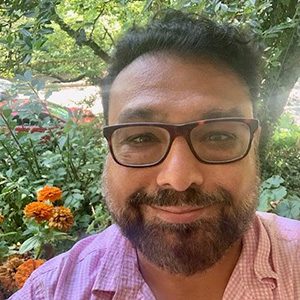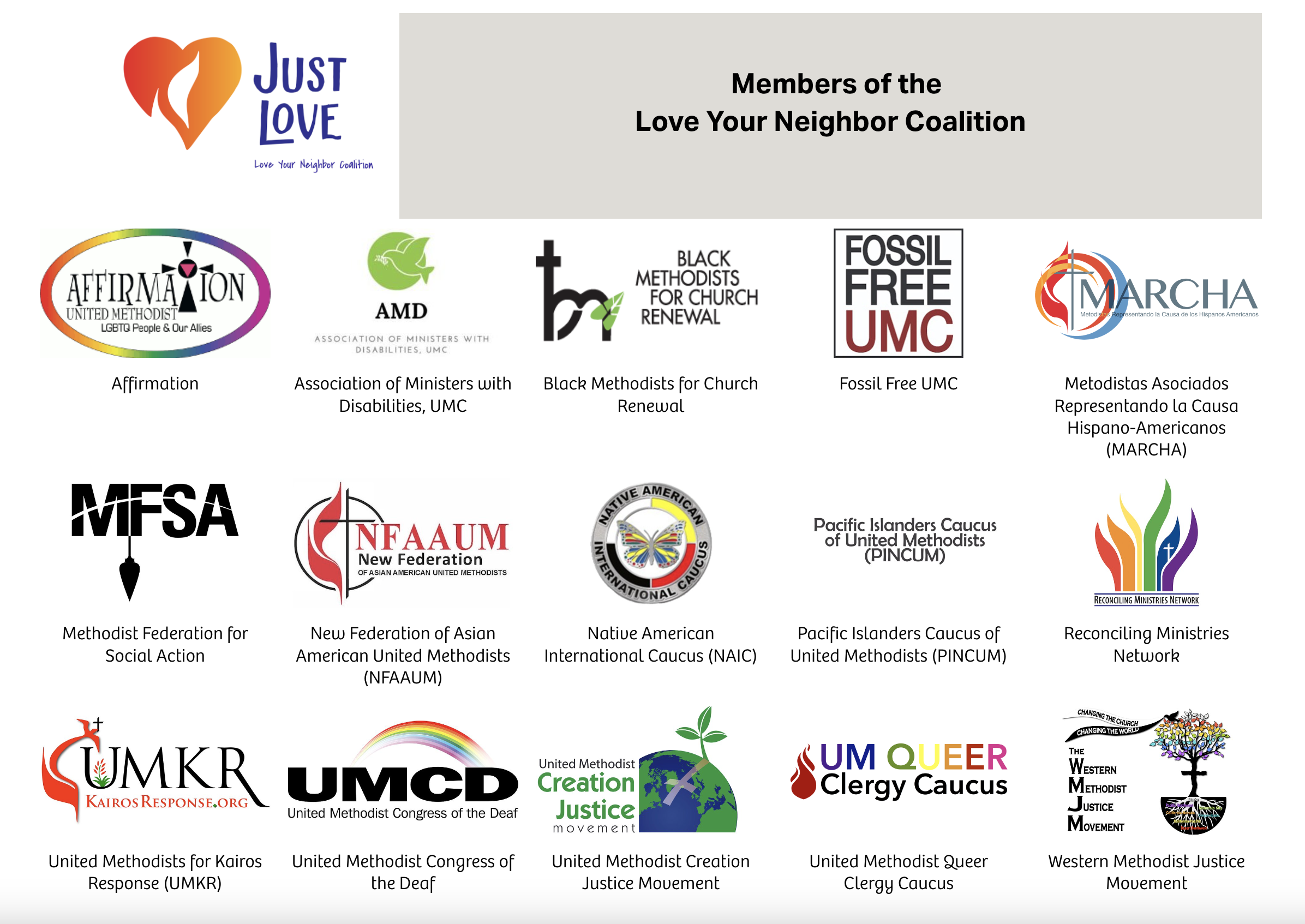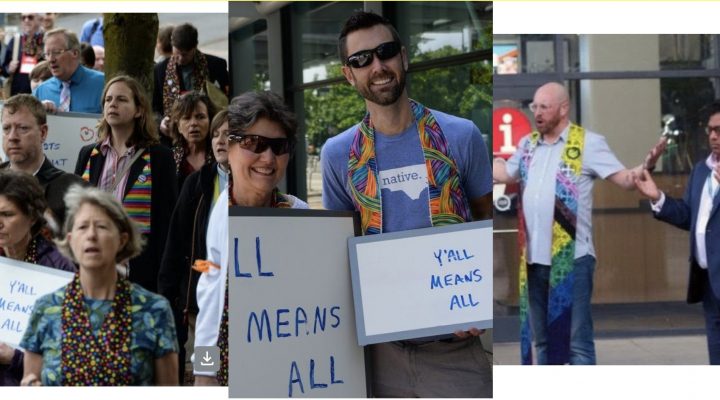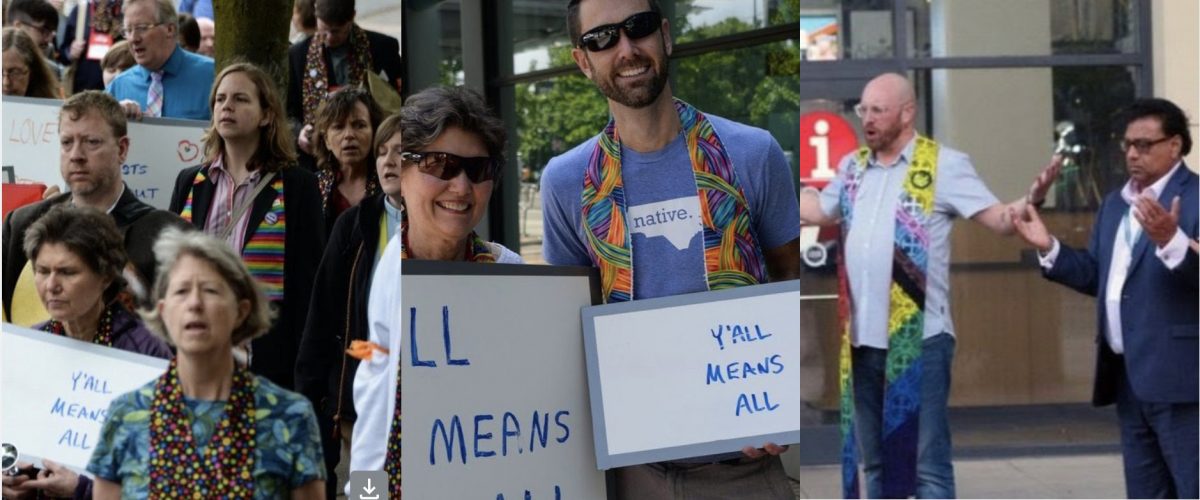While many parts of The United Methodist Church see the coming General Conference focused on “3 Rs” — regionalization, Revised Social Principles and removal of LGBTQ bans — the Love Your Neighbor Coalition is bringing attention to two “Hs” — hospitality and human rights.
The Love Your Neighbor Coalition, or LYNC as it’s known, is a collaboration of 15 social justice, racial and ethnic caucuses that previously worked separately in General Conference politics, said Neal Christie, the coalition’s co-convener and spokesman. That previous action changed at the 2012 General Conference in Tampa, Fla., when LYNC members coordinated their public witness and legislative advocacy together. The coordinated action drew attention from Central Conference delegates who became curious about how the U.S. caucuses worked, he said.
Christie served as associate general secretary of the General Board of Church and Society from 1996 to 2022, before moving to an international ministry post with the Baltimore-Washington Annual Conference. He recently was named executive director of the Federation of Indian American Christians of North America, an advocacy organization started by Catholics, Orthodox and Protestants to address religious persecution and human rights in India.
Members of the Love Your Neighbor Coalition include:
- Affirmation, a group advocating for the LGBTQ community
- Association of Ministers with Disabilities, UMC
- Black Methodists for Church Renewal
- Fossil Free UMC, advocating for the UMC to divest of its financial holdings in fossil-fuel companies
- Metodistas Asociados Representando la Causa Hispano-Americanos (MARCHA), the caucus of Latino and Hispanic United Methodists
- Methodist Federation for Social Action
- New Federation of Asian American United Methodists (NFAAUM)
- Native American International Caucus (NAIC)
- Pacific Islanders Caucus of United Methodists (PINCUM)
- Reconciling Ministries Network, an organization promoting full LGBTQ inclusion in the UMC through publicly welcoming local churches and individuals
- United Methodists for Kairos Response (UMKR), advocates for justice for Palestinians and peace in the Middle East
- United Methodist Congress of the Deaf
- United Methodist Creation Justice Movement
- United Methodist Queer Clergy Caucus
- Western Methodist Justice Movement
“Our caucuses represent a broad swath of the church,” Christie said. “We may not agree on everything, but we want a place at the table for everyone.”
LYNC’s plans for the postponed 2020 General Conference happening April 23 to May 3 in Charlotte, N.C., are two-fold: provide “global hospitality” to everyone attending the conference and support one another’s legislative proposals.

Neal Christie
Christie said the coalition will track 17 resolutions concerned with different human rights aspects such as reproductive rights, fossil-fuel divestment, strengthening local-church “green teams” for creation care, justice for Palestinians, and disability issues such as sanctuary access, among other concerns. In most cases, the caucuses took care to craft their petitions from a non-U.S.-centric perspectives, he said.
“This is why we want regionalization; it’s a more engaged way of being church … in society,” Christie said. “Petitions need to be ‘both and’ in multiple regions.”
More than monitoring legislation, LYNC hopes to model new ways of collaboration for a denomination stressed by disaffiliations yet striving to be a fully equitable worldwide church in the 21st century.
“People presume we’re just tracking our legislation,” he told United Methodist Insight in an interview. “We are tracking legislation that matters to our coalition members, but we also will be very present at General Conference. By being very present I mean LYNC is positioned to connect caucuses with each other, connect delegates with caucus members who are directly impacted by a justice issue, to build relationships that last well beyond the last day of General Conference.”
For example, LYNC members are not of like mind about how to implement the UMC’s hottest hot-button issue, the removal of “harmful language” about LGBTQ inclusion. Nonetheless, “every caucus in the coalition absolutely agrees that the church must end the harm it is doing to God’s children,” Christie said. Only the Queer Clergy Caucus has submitted legislation specifically on human sexuality, but LYNC backs the Revised Social Principles, which don’t include the anti-homosexuality language of the current Social Principles.
“We’re for full inclusion but we recognize we have to keep discussing the issues,” Christie said. “We make sure that each caucus knows what other caucuses care about. There are different perspectives in every racial-ethnic caucus, as well as in other caucuses. Even when there are differences, they stand together.”
Christie said LYNC members hope after the UMC’s divisive season of disaffiliations, the coalition can demonstrate cooperation and encourage delegates and observers to keep in conversation with one another.
“The caucuses are the one place this cooperation can actually happen.”
“The caucuses are the one place this cooperation can actually happen,” he explained. “The caucuses, unlike general agencies’ boards of directors, are not based on who is elected to represent a jurisdiction in an agency or board. Caucus members come directly from the grassroots, and they are accountable to the grassroots movements in our church.”
He believes this networking model is the future for justice ministries in the UMC, given budget challenges and the need to regionalize ministry.
“The caucuses don’t agree on everything, but we take seriously one anothers’ concern,” Christie said. “We hope our witness will get people asking questions, like, ‘Isn’t it interesting that the Native American Indian Caucus cares about the issues of the Association of Ministers with Disabilities? Why do they both care about the war in Gaza and Palestinians, like United Methodists for Kairos Response?'”
LYNC strives to model commonalities rather than differences, Christie said. “The benefit of LYNC is that we have uneasy conversations. We look for commonalities, but we don’t paste over differences. I don’t know where else in the church we have these kinds of gatherings.”

Related articles:
Top issues for United Methodists’ Global Assembly taking shape | Analysis by Cynthia Astle
One quarter of U.S. United Methodist churches have disaffiliated
United Methodists will decide realigning church’s structure, authority in 2024


